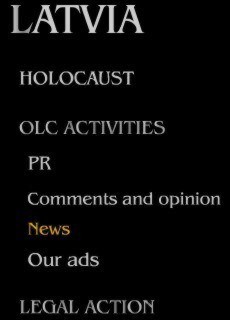|
RIGA—According to most estimates, there were around 1500
participants today in the city-center ceremony honoring
the Waffen SS, about 1000 police, and about one hundred
protesters who turned out in opposition to the event.
The ongoing campaign by some East European governments to repackage far-right
ultranationalist politics and policies (with
concomitant antisemitic, racist and Nazi-glorifying
undertones) as a wholesome British-conservative-style
“center right” has suffered a major blow.
The battleground of ideas has in recent weeks
shifted to the annual Waffen SS commemoration
ceremony held at Liberty Monument, the symbolic
heart of the capital of Latvia, with the
blessing of some of the nation’s top leaders.
This
year, it seemed as if the highest figures
in Latvian politics had abandoned any semblance
of disassociating themselves from the internationally
discredited annual event that does palpable
harm to Latvia’s international standing,
and particularly within the European Union
and NATO communities.
The
Latvian president told the world that he
believed people should “bow their heads”
in respect to his country’s Nazi-established
Waffen SS. And then, the Latvian ambassador
to the United Kingdom wrote a curiously detailed
letter to anti-march campaigner Monica Lowenberg,
whose petition against the march amassed
over six thousand signatures by today.
Less
then a month before the march, the European
Commission released its report condemning
the Waffen SS marches as incompatible with
European values. To some outside observers
it had seemed that this alone this year tipped
the balance, invalidating the argument that
if a group of pro-Nazi combatants, who had
sworn an oath to Adolf Hitler and fought
for Nazi Germany did not necessarily comprise
war criminals, it was therefore appropriate
for a European Union and NATO country to
glorify that group in a state-sanctioned
center-of-the-capital-city ceremony blessed
by the leaders of the land.
The positioning of police relative to the entirely peaceful anti-Nazi demonstrators
seemed at times startling today. The only
acts of forcefulness came from the event’s
organizers and the police themselves.
Before the start of the event, a delegation, who had obtained permission, laid
a wreath at Liberty Monument in memory of
the victims of the Latvian Holocaust.
Just before the actual ceremony got underway, officials covered over the wreath
with the Latvian Waffen SS emblazoned sign,
seeming to use the wreath as a kind of stand
to keep the sign upright. Moreover the black
ribbon in memory of the Holocaust’s victims
was pushed underneath the wreath onto the
pavement.
Later, during the ceremony, Joe Koren, a leader of Latvia Without Nazism, and
Latvian member of the European Parliament
Tatyana Zhdanok moved the wreath from under
the Waffen SS sign to separate it from the
Nazi-era emblem.
Mr. Koren and MEP Zhdanok were rapidly and roughly removed by police and a scuffle
ensued, with a mass of photographers closing
in on the scene.
For many years, state-supported pro-Nazi demonstrations throughout Eastern Europe
and beyond have been unnerved by the determined
and morally compelling presence of Holocaust
historian, justice seeker and Nazi hunter
Dr. Efraim Zuroff, director of the Simon
Wiesenthal Center Israel office. Today’s
march was no exception. Dr. Zuroff gave a
large number of interviews to local and international
media, persuasively countering the official
line that honoring the Waffen SS was merely
a matter of respect to some fallen soldiers.
Perhaps the most vocal condemner of the march and the phalanx of state-supported
Nazi-glorifying activities was Joel Rubinfeld,
co-president of the Brussels-based European
Jewish Parliament. Here (at right), he is
telling one of the senior police officials
on hand that the event is a disgrace to the
European Union and civilized society (DefendingHistory.com
video in preparation).
The inimitable Joe Koren handed out concentration camp uniforms to protesters.
One of the first to don the uniform was petition organizer Monica Lowenberg of
London, whose uncle, Paul Theodor Loewenberg
(Levenbergs), was a German Jew who sought
refuge in Latvia in 1940 and was then, after
the Nazi invasion, incarcerated in the Riga
Ghetto in 1941, and killed along with much
of Riga Jewry at the nearby Rumbula mass
murder site.
Ms. Lowenberg played a prominent role in confronting pro-fascists throughout
the event. Here, arguing with a young nationalist
who said he was a lawyer, she is flanked
by fellow demonstrator Algirdas Paleckis,
a controversial Lithuanian politician who
has steadfastly combated state efforts to
obfuscate the Lithuanian Holocaust and rehabilitate
the local killers as supposed national heroes.
For
what seemed a considerable expanse of time,
Ms. Lowenberg seemed to be guarded by a designated
policewoman who tried, without success, to
prevent her from entering the pro-fascist
area.
To
add to the forces protesting the glorification
of Nazism in Latvia, the Latvia without Nazism
organization, led by Valery Engel and Joe
Koren, held an International Roundtable on
the march and on the rise of neo-Nazism in
the region to coincide with the March 16th
event (with a long morning coffee break to
enable participation in the anti-Nazi effort).
The
Roundtable was attended by a number of international
participants, including Leonid Bard, executive
vice president of the American Section of
the World Congress of Russian Jews; Joel
Rubinfeld, Co-President of the European Jewish
Parliament (Brussels); Helmut Scholz, Austrian
member of the European Parliament (Brussels);
Masha Girshin, program director of Blue Card
(New York City). defendinghistory.com
| 

